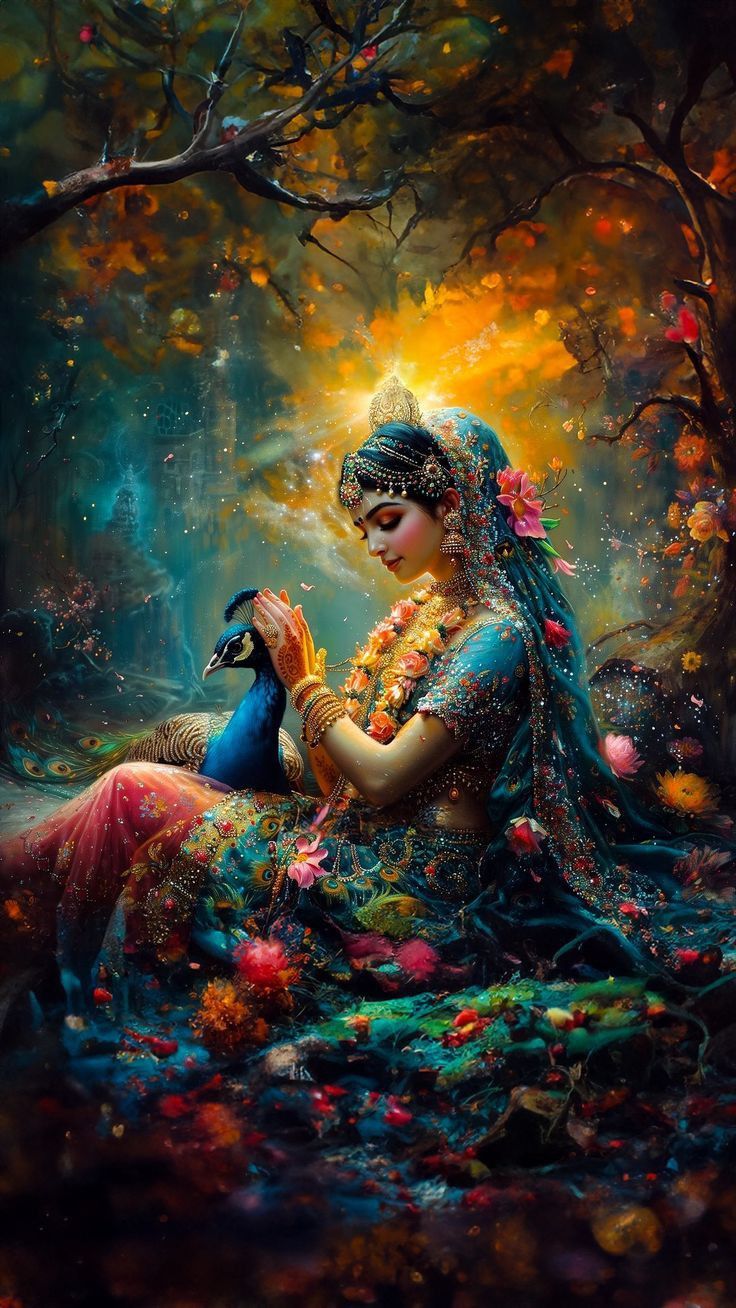7 Magical Facts About Goddess Radha That Will Touch Your Heart
Goddess Radha, the divine consort of Lord Krishna, is revered as the embodiment of love, devotion, and spiritual longing. Her life and stories represent pure devotion (bhakti), emotional depth, and the eternal bond between the soul and the divine. Radha’s influence extends beyond mythology into cultural, spiritual, and social realms, inspiring millions to pursue love, devotion, and righteousness. This article explores her history, fascinating facts, timeline, significance, FAQs, daily life impact, and societal importance in a detailed and human-friendly manner.
History of Goddess Radha
Goddess Radha’s story is primarily narrated in Bhagavata Purana, Gita Govinda by Jayadeva, and various Vaishnava texts:
Birth and Early Life: Radha was born in Barsana, near Vrindavan. She grew up immersed in devotion, simplicity, and natural beauty, reflecting her divine character.
Association with Krishna: Radha’s love and devotion to Lord Krishna symbolize the ultimate spiritual union, representing pure, selfless devotion.
Radha-Krishna Leelas: Their pastimes (leelas), including Raas Leela and Vrindavan tales, highlight devotion, divine love, and the soul’s longing for God.
Role in Vaishnavism: Radha is central in Vaishnava traditions, especially in the worship of Krishna Bhakti, and is revered as the supreme devotee and divine energy (Shakti) of Krishna.
Cultural Influence: Her stories have inspired poetry, classical dance, music, and art, making her a symbol of spiritual and cultural devotion.
Interesting Facts About Goddess Radha
Embodiment of Devotion: Radha represents unconditional love and devotion (bhakti) to the divine, inspiring spiritual aspirants.
Symbol of Divine Love: The Radha-Krishna relationship exemplifies the eternal union of the soul with God, beyond worldly attachments.
Cultural Icon: Celebrated in festivals like Radhashtami, she influences music, dance, art, and literature.
Spiritual Power: Radha is considered the supreme goddess of devotion, capable of guiding devotees toward spiritual realization.
Divine Energy: She embodies Krishna’s divine Shakti, representing compassion, spiritual yearning, and emotional depth.
Teachings of Love and Detachment: Radha’s life teaches that true devotion is selfless, transcending material desires.
Global Influence: Radha inspires devotional movements, literature, and arts across India and worldwide, fostering spiritual and emotional connection.
Timeline of Radha’s Life and Worship
Mythological Era (Treta-Yuga / Dwapara-Yuga): Birth in Barsana, youth in Vrindavan, and pastimes with Krishna.
Medieval Period (c. 12th–15th Century): Jayadeva’s Gita Govinda and other Vaishnava texts elaborate Radha-Krishna devotion.
16th–18th Century: Bhakti movement popularizes her devotion in North India, influencing poetry, music, and temple culture.
Modern Era: Celebrated globally through Radhashtami, Janmashtami, and Krishna devotion festivals, inspiring spiritual practice and arts.
Significance of Goddess Radha
Radha holds spiritual, cultural, and societal significance:
Spiritual Symbol: Embodies pure, selfless love and devotion toward God.
Moral Guidance: Inspires faithfulness, dedication, patience, and ethical love.
Cultural Influence: Integral to festivals, arts, dance forms (like Ras Leela), and devotional poetry.
Role Model: Teaches the importance of inner devotion over external rituals.
Community Unity: Her worship brings communities together during Radhashtami, Holi, and Krishna festivals.
Emotional Impact: Inspires hope, emotional resilience, and spiritual longing in devotees.
Global Spiritual Influence: Radha-Krishna devotion has influenced spiritual movements like ISKCON worldwide.
FAQs About Goddess Radha
Q1: Who is Goddess Radha?
A1: Radha is the divine consort of Lord Krishna, representing pure love, devotion, and spiritual longing, revered in Vaishnavism and Bhakti traditions.
Q2: What is Radhashtami?
A2: Radhashtami is the celebration of Radha’s birth anniversary, marked by devotional prayers, fasting, and cultural festivities.
Q3: How does Radha inspire spiritual life?
A3: She embodies unconditional devotion, patience, and emotional surrender, guiding devotees toward spiritual realization.
Q4: What is the significance of Radha-Krishna Leelas?
A4: Their pastimes symbolize divine love, soul’s yearning for God, and the union of devotion with the divine.
Q5: How is Radha worshiped?
A5: Through prayers, devotional songs (bhajans), dance, meditation, and temple rituals, especially during Radhashtami and Krishna-related festivals.
Impact on Daily Life
Goddess Radha’s teachings influence daily life in profound ways:
Emotional Growth: Encourages love, compassion, patience, and selfless devotion.
Spiritual Discipline: Inspires meditation, chanting, and devotional practices.
Cultural Participation: Devotees engage in festivals, Ras Leela performances, and devotional music.
Personal Relationships: Promotes loyalty, emotional integrity, and pure love in human relationships.
Moral Inspiration: Encourages selflessness, dedication, and ethical devotion in everyday life.
Observance and Wishing
Radhashtami: Celebrates her birth, with prayers, fasting, singing bhajans, and visiting temples for blessings of love, devotion, and spiritual growth.
Holi and Janmashtami: Her presence is honored during Krishna-related festivals, emphasizing joy, divine love, and community bonding.
Daily Devotion: Reciting Radha-Krishna stories, meditating, and singing devotional songs fosters spiritual connection, emotional well-being, and moral guidance.
Wishing: Seek her blessings for love, emotional harmony, devotion, and guidance in life.
Community Participation: Festivals and gatherings unite communities, promoting charity, cultural preservation, and devotional practices.
Conclusion: Why Goddess Radha Matters
Goddess Radha is not just a mythological figure; she symbolizes pure love, devotion, and emotional and spiritual connection. Her life offers timeless lessons on selfless devotion, patience, moral integrity, and spiritual yearning. On a societal level, her worship fosters cultural unity, ethical behavior, and devotional practices.
By embracing the teachings of Radha, individuals cultivate emotional depth, spiritual growth, patience, and moral clarity, while society benefits from stronger communal bonds, cultural continuity, and devotional engagement. Radha remains a beacon of love and devotion, inspiring generations to pursue a life of spiritual fulfillment and heartfelt dedication.
Quick Recap: 7 Magical Facts About Goddess Radha
Embodiment of pure love and devotion to Krishna.
Represents the eternal union of soul and divine.
Inspires emotional depth, patience, and resilience.
Central to Radhashtami, Holi, and Krishna festivals.
Influences devotional music, dance, poetry, and art.
Teaches selfless devotion, ethical love, and spiritual longing.
Global inspiration through Vaishnava movements and ISKCON traditions.








